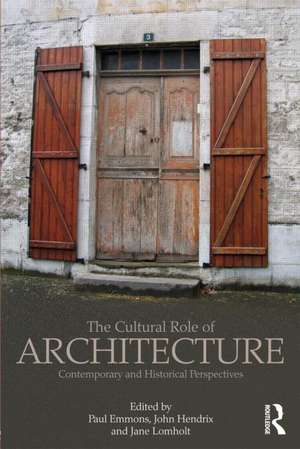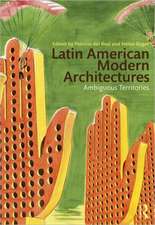The Cultural Role of Architecture: Contemporary and Historical Perspectives
Editat de Paul Emmons, Jane Lomholt, John Shannon Hendrixen Limba Engleză Paperback – 31 ian 2012
Chapters written by international academics in history, theory and philosophy of architecture, examine how different modes of representation throughout history have drawn profound meanings from cultural practices and beliefs. These are as diverse as the designs they inspire and include religious, mythic, poetic, political, and philosophical references.
| Toate formatele și edițiile | Preț | Express |
|---|---|---|
| Paperback (1) | 323.75 lei 6-8 săpt. | |
| Taylor & Francis – 31 ian 2012 | 323.75 lei 6-8 săpt. | |
| Hardback (1) | 850.91 lei 6-8 săpt. | |
| Taylor & Francis – feb 2012 | 850.91 lei 6-8 săpt. |
Preț: 323.75 lei
Preț vechi: 424.23 lei
-24% Nou
Puncte Express: 486
Preț estimativ în valută:
61.96€ • 67.28$ • 52.04£
61.96€ • 67.28$ • 52.04£
Carte tipărită la comandă
Livrare economică 23 aprilie-07 mai
Preluare comenzi: 021 569.72.76
Specificații
ISBN-13: 9780415783415
ISBN-10: 0415783410
Pagini: 256
Ilustrații: 52 halftones
Dimensiuni: 156 x 234 x 15 mm
Greutate: 0.43 kg
Ediția:1
Editura: Taylor & Francis
Colecția Routledge
Locul publicării:Oxford, United Kingdom
ISBN-10: 0415783410
Pagini: 256
Ilustrații: 52 halftones
Dimensiuni: 156 x 234 x 15 mm
Greutate: 0.43 kg
Ediția:1
Editura: Taylor & Francis
Colecția Routledge
Locul publicării:Oxford, United Kingdom
Public țintă
Postgraduate and UndergraduateCuprins
Prologue: Cultivating Architecture Part 1: Architecture as Agent of Recovery, a Testimony to Values Introduction 1. Greek Theatre as an Embodiment of Cultural Meaning 2. The Restoration of the Hut of Romulus 3. Il Corridoio Vasariano: A Resplendent Passage to Medici and Vasari’s Grandeur 4. Language Beyond Metaphor: The Structural Symbolism of Borromini’s Sant’Ivo alla Sapienza 5. Villa Albani, Repository of Multiple Narratives 6. The Space of Fiction: On the Cultural Relevance of Architecture 7. Using Old Stuff and Thinking in a New Way: Material Culture, Conservation and Fashion in Architecture Part 2: Architecture as Substance and Sustenance: Cultural Desires and Needs Introduction 8. De Beata Architectura, Places for Thinking 9. Sverre Fehn: Materials and Culture 10. A Persuasive Topology: Alvar Aalto and the Ambience of History 11. Freiraum: Ideas of Freedom and Nature in the Work of Mies van der Rohe 12. Architectural Poetics in Alvaro Siza’s Church of Santa Maria 13. "The Play of Plans: Le Corbusier’s Serious Game of Dominos 14. Something out of the "Ordinary" Part 3: A Time of Aspirations: Cultural Understanding of the Roles of Architecture 15. The Relevance of Beauty in Architecture 16. Architectural Creation Between ‘Culture’ and ‘Civilization’ 17. Architectural Identity Demystified: Visual Voices from the Arab World 18. The Fiction of the Digital in the Mediated City 19. The Memory of Ruins and the Ruins of Memory 20. The Conceptual Bearings of the Intercultural Role of Architecture 21. Architecture as the Psyche of a Culture Epilogue: The Necessity of Architecture
Notă biografică
Paul Emmons is a registered architect and Associate Professor at the Washington-Alexandria Architecture Center of Virginia Tech, USA where he directs the PhD program in Architecture and Design.
John Hendrix is Professor of Architectural History at the University of Lincoln, UK and Adjunct Professor at Roger Williams University and at Rhode Island School of Design, USA.
Jane Lomholt is a Senior Lecturer in the School of Architecture at the University of Lincoln, UK, where she is head of History and Theory.
John Hendrix is Professor of Architectural History at the University of Lincoln, UK and Adjunct Professor at Roger Williams University and at Rhode Island School of Design, USA.
Jane Lomholt is a Senior Lecturer in the School of Architecture at the University of Lincoln, UK, where she is head of History and Theory.
Descriere
Exploring the ambiguities of how we define the word ‘culture’ in our global society, this book identifies its imprint on architectural ideas. Chapters written by international academics in history, theory and philosophy of architecture examine how different modes of representation throughout history have drawn profound meanings from cultural practices and beliefs.






